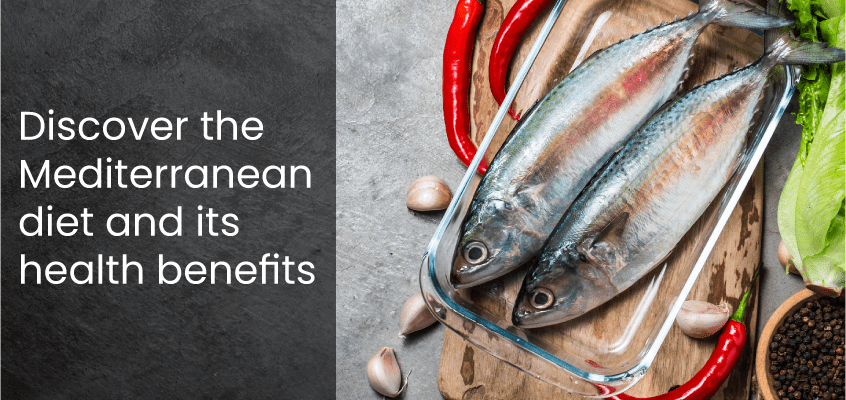Introduction
Greece, Italy, Spain, and France are countries bordering the Mediterranean sea, and the traditional plant-based foods in these countries make up the Mediterranean diet. Adopting the Mediterranean diet is the right option if you are in pursuit of a nutritious diet that is also delicious. Besides being delectable, the Mediterranean diet helps support brain function, maintain heart health, and regulate blood glucose levels.
What is the Mediterranean diet?
The Mediterranean diet refers[1] to the traditional cuisine in countries surrounding the Mediterranean sea. It emphasizes the generous help of fish in your daily diet to obtain healthy fats rich in omega-3 fatty acids for comprehensive nutrition.
The Mediterranean diet uses olive oil, seafood, nuts, grains, fruits, and vegetables to enhance heart health. The diet restricts the use of dairy, except for cheeses and yogurts. It also expects you to avoid red meat and sugary dishes., and it.
The Mediterranean diet is not a typical diet plan, and it follows the age-old eating traditions of people living around the Mediterranean sea. The findings of several researchers have established that the people[2] in these regions enjoyed a remarkably long lifespan with minimal risk of chronic illnesses like osteoarthritis, diabetes, and heart problems. The Mediterranean diet is perfect for people searching for a meal plan to reduce the risk of chronic conditions.
Visit unitedwecare.com to learn more about the health advantages of the Mediterranean diet.
The science behind the Mediterranean diet
Enough scientific evidence suggests that the Mediterranean diet[4] reduces the risk of several chronic ailments. The 2022 edition of the U.S. News and World Report places the Mediterranean diet in the topmost position among 40 diets because of its benefits of diabetes prevention and control, reduction in cardiovascular risk, weight loss, and brain health. The following are a few distinct health advantages of a Mediterranean diet backed by scientific evidence:
- The Mediterranean diet is the most researched diet option. The evidence comes from several generations of healthy people living around the Mediterranean sea using the diet as a way of life.
- The diet leads to a reduction in the risk of heart attacks.
- Since the Mediterranean diet includes vegetables, fruits, nuts, and whole grains, it works to improve nutrition and control blood sugar levels.
- The Mediterranean diet is also effective in achieving long-term blood glucose control.
- A large study established the Mediterranean diet’s efficacy in improving cognitive functions, concentration, and memory.
The health benefits of the Mediterranean diet
The Mediterranean diet avoids a restrictive approach common in any standard diet plan and allows you to make healthy food choices that are delicious and enjoyable.[3]
- The evolution of this diet in the Mediterranean region is helping the local inhabitants derive a broad spectrum of health benefits.
- The substantial use of fruits and vegetables in the Mediterranean diet gives you sufficient amounts of disease-fighting antioxidants in your daily nutrition and builds immunity. In addition, using healthy fats and reducing carbohydrate intake is helpful for cardiovascular health.
- The Mediterranean diet also employs the hearty use of olive oil, which has cholesterol-lowering properties. These ingredients help reduce the risk of heart attacks.
- The Mediterranean diet may not be ideal for weight loss, as it did not evolve as a weight-reducing meal plan. However, the diet offers myriad health benefits, including maintaining a healthy weight.
- The omega-3 fatty acids in fish like sardines, salmon, and mackerel, which are part of the Mediterranean diet, help minimize inflammation and reduce the risk of arthritis. These are also helpful in lowering triglycerides and preventing blood clotting. These properties of the Mediterranean diet are also beneficial for stroke prevention.
Guidelines for following a Mediterranean diet
Unlike most diet plans, there are no hard and fast rules to follow in the Mediterranean diet.[5] It primarily involves the addition of more vegetables, fruits, nuts, and whole grains to your diet.
Olive oil is the primary source of fats in a Mediterranean diet, while fish replaces red meat as a protein source. Filling half your plate with fruits and vegetables and two-quarters of whole grains and healthy proteins is a general guideline in the Mediterranean diet.
Fruits and vegetables form a large part of a Mediterranean meal, and eating up to five servings of fruits and vegetables helps mitigate cardiovascular risks. Replacing red meat with fish as a protein source is crucial in the Mediterranean diet, and one may use poultry in moderation.
Using whole grains instead of refined grains like rice is essential to the Mediterranean diet, as whole grains help control blood glucose levels.
Foods to eat and avoid on a Mediterranean diet
Several schools of thought regarding which foods form part of the Mediterranean diet. It may be because of the different cuisines in various countries. The Mediterranean diet comprises mainly plant foods and restricts the use of meat and other animal products.
Foods to eat
The following are the main foods belonging to the Mediterranean diet. Note that vegetables and fruits form the central portion of the diet:
-
Fruits – melons, grapes, apples, oranges, strawberries, and bananas
-
Vegetables – Spinach, cauliflower, broccoli, sprouted beans, and tomatoes
-
Whole grains – Pasta, wholewheat bread, corn, oats, and barley
-
Fish – sardines, mackerels, salmon, and tuna
-
Nuts – cashews, almonds, walnuts, and hazelnuts
-
Nut butter – Peanut and almond butter
-
Seeds – pumpkin and sunflower seeds
Foods to avoid
-
Refined oils
-
Added sugars
-
Processed foods and meats
-
Refined grains
Precautions while taking the Mediterranean diet
-
Minimize processed foods: It is advisable to avoid processed and packaged foods that are heavy in added sugars, refined carbohydrates, and harmful fats if you want to get the full health benefits of the Mediterranean diet.
-
Alcohol consumption should be kept to 1-2 drinks per day for males and one for women, even if moderate alcohol use is part of the Mediterranean diet. Having too much alcohol can result in several health issues.
-
Although the Mediterranean diet is well-known for its heart-healthy fats like olive oil and almonds, it’s crucial to watch how much fat you consume. The risk of developing heart disease can rise if you drink too much saturated or trans fat.
-
Speak with a healthcare expert. It’s vital to speak with a healthcare provider before beginning the Mediterranean diet if you have a pre-existing medical condition or are taking medication.
-
Don’t just rely on your diet: The Mediterranean diet is healthy but does not have all the answers. For general health and well-being, it’s crucial to prioritize getting adequate sleep, reducing stress, and engaging in regular physical activity.
Conclusion
The Mediterranean diet is a way of life or an eating pattern that adopts the traditional eating habits of people in the Mediterranean region. The diet emphasizes the use of vegetables, whole grains, nuts, and fruits, with fish as a significant source of proteins in place of red meat. It is helpful for aged people also to age healthily.
Switching to the Mediterranean diet lowers bad cholesterol, minimizing the risk of strokes and heart attacks. It is also helpful in maintaining normal blood glucose levels. Several studies have confirmed the role of the Mediterranean diet in preventing Alzheimer’s and Parkinson’s disease. According to ongoing research, the Mediterranean diet also helps reduce stress, anxiety, and depression.
Physicians and nutritionists recommend the Mediterranean diet to prevent and manage chronic diseases, calorie control, and lifestyle disorders like diabetes, hypertension, stress, and osteoarthritis.
Visit unitedwecare.com to discover
References
[1] C. Davis, J. Bryan, J. Hodgson, and K. Murphy, “Definition of the Mediterranean diet; A literature review,” Nutrients, vol. 7, no. 11, pp. 9139–9153, 2015.
[2] A. Keys, “Mediterranean diet and public health: personal reflections,” Am. J. Clin. Nutr., vol. 61, no. 6, pp. 1321S-1323S, 1995.
[3] M. A. Martínez-González et al., “Benefits of the Mediterranean diet: Insights from the PREDIMED study,” Prog. Cardiovasc. Dis., vol. 58, no. 1, pp. 50–60, 2015.
[4] W. C. Willett, “The Mediterranean diet: science and practice,” Public Health Nutr., vol. 9, no. 1A, pp. 105–110, 2006.
[5] L. Barrea, G. Pugliese, D. Laudisio, A. Colao, S. Savastano, and G. Muscogiuri, “Mediterranean diet as a medical prescription in menopausal women with obesity: a practical guide for nutritionists,” Crit. Rev. Food Sci. Nutr., vol. 61, no. 7, pp. 1201–1211, 2021.











